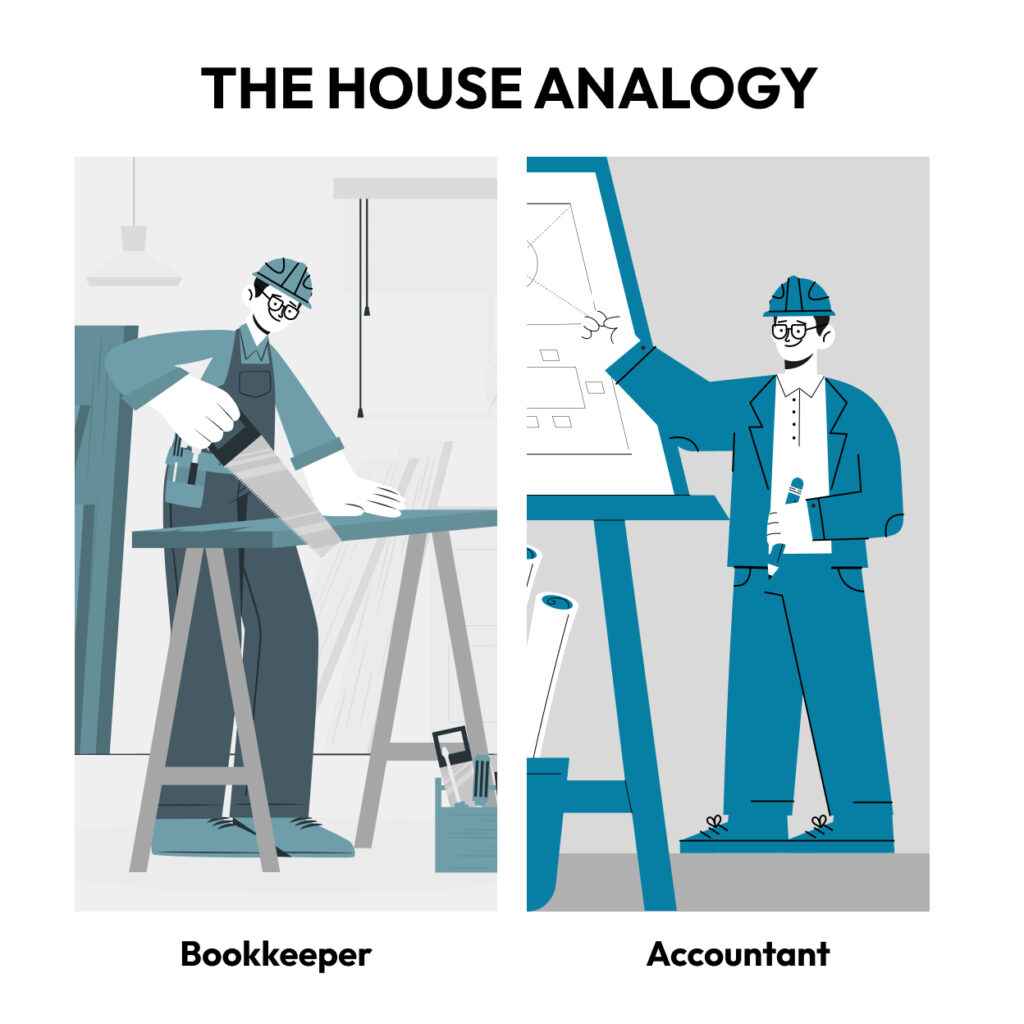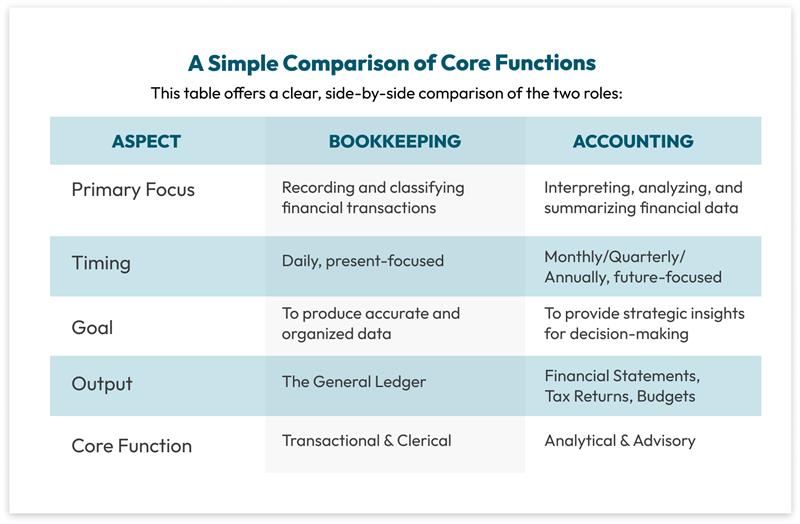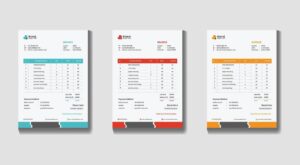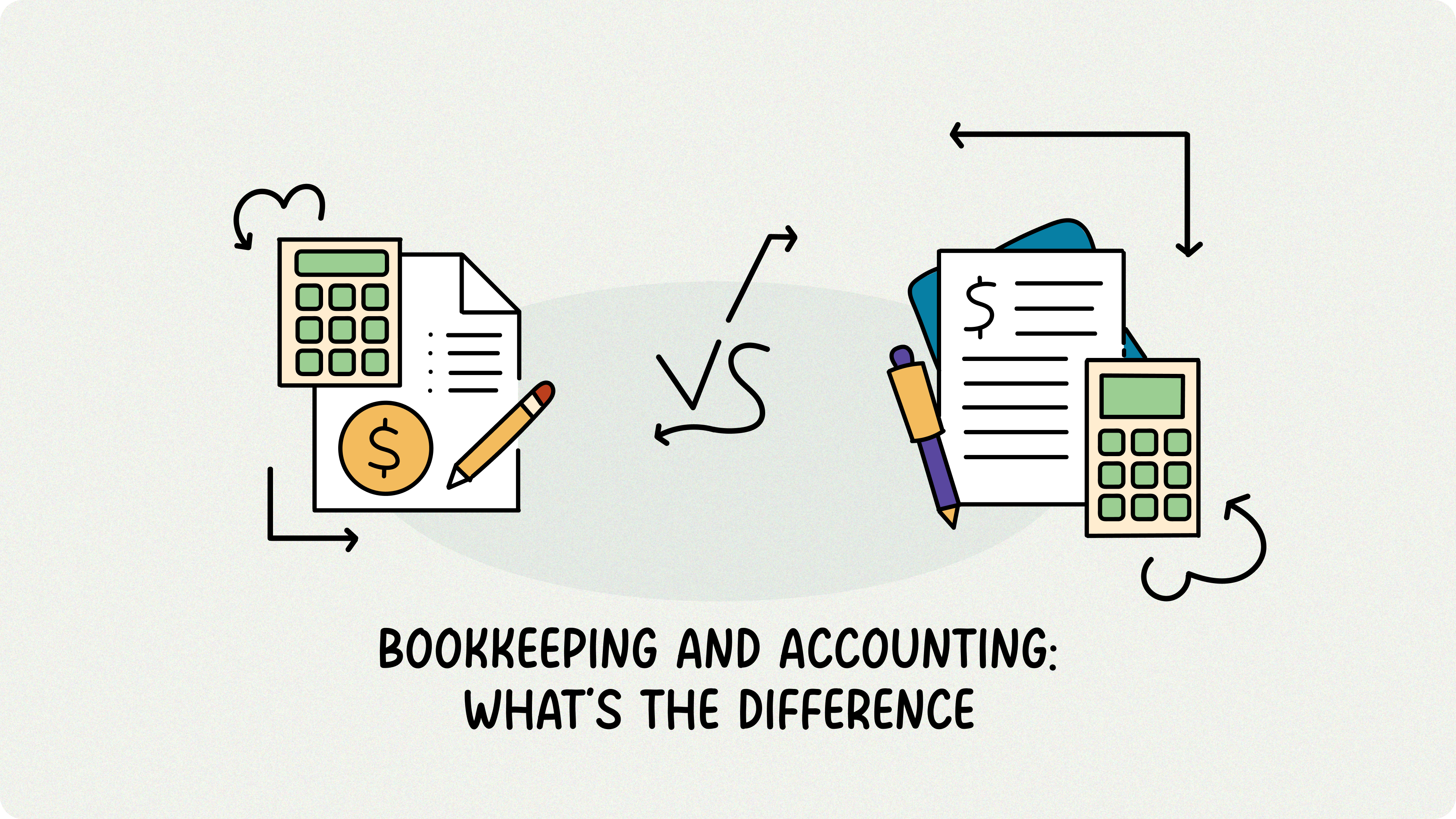Ever wondered about the people who keep a company’s financial world spinning? Two key players in this arena are bookkeepers and accountants, and while their roles are often confused, they are distinctly different yet deeply connected.
In short, bookkeeping is the process of recording daily financial transactions, while accounting is the high-level process of analyzing and interpreting that data to make strategic business decisions.
Think of it like building a house. The bookkeeper is the one laying the foundation and framing the structure, ensuring every brick and beam is perfectly in place. The accountant is the architect who analyzes that structural blueprint, advises on how to develop the property for long-term value, and ensures it complies with all regulations. One builds the structure; the other ensures it’s a sound investment.

Table of Contents
- A Simple Comparison of Core Functions
- The Role of a Bookkeeper
- The Role of an Accountant
- A Real-Life Coffee Shop Example
- Can Your Bookkeeper and Accountant Be the Same Person?
- Ready to Streamline Your Financials?
A Simple Comparison of Core Functions
This table offers a clear, side-by-side comparison of the two roles:

The Role of a Bookkeeper
A bookkeeper is the master of the day-to-day financial records. Their primary role is to ensure every single financial transaction is accurately recorded and categorized. This is a crucial, detail-oriented job that forms the bedrock of a company’s financial reporting. Without it, you’re making decisions in the dark.
Key responsibilities of a bookkeeper include:
- Recording financial transactions: Logging all sales, purchases, payments, and receipts.
- Managing invoices and paying bills: Ensuring vendors are paid on time and customers are invoiced correctly.
- Reconciling bank statements: Matching the company’s records to bank and credit card statements.
- Processing payroll: Calculating employee wages, withholding taxes, and ensuring timely payments.
- Maintaining the general ledger: Keeping the company’s main financial record accurate and up-to-date.
The Role of an Accountant
An accountant takes the meticulously recorded data from the bookkeeper and uses it to see the bigger financial picture. They analyze this information, prepare formal financial statements, and provide strategic advice to help the business grow and remain compliant. A good accountant doesn’t just report the numbers; they tell you the story behind them.
Key responsibilities of an accountant include:
- Financial statement preparation: Creating key reports like the income statement, balance sheet, and cash flow statement.
- Financial analysis: Interpreting financial data to identify trends, profitability, and opportunities for improvement.
- Tax planning and preparation: Ensuring the company complies with all tax laws and finding legal ways to minimize tax liability. This alone can save a business thousands.
- Auditing: Reviewing financial records to ensure accuracy and compliance with accounting standards.
- Budgeting and forecasting: Helping the business plan for the future by analyzing past data to forecast revenue and cash flow, guiding smarter inventory and spending decisions.
- Advising on financial strategy: Providing insights on major financial decisions, such as pricing models, major purchases, or expansion plans.
A Real-Life Coffee Shop Example
At Joe’s Coffee House, its bookkeeper works on a daily or weekly basis. They record every sale of coffee and pastries, log the invoices for milk deliveries and new equipment, process payroll for the baristas, and reconcile the cash register with the bank deposits. They ensure the fundamental data is flawless.
At the end of the quarter, the accountant takes this data. They prepare a profit and loss statement and see that while revenue is high, the cost of goods sold is eating into margins more than expected. They advise the owner to renegotiate with a supplier or adjust menu prices. They also use the year’s data to prepare the tax return and create a budget for the next year, forecasting potential cash flow for a planned renovation.
The bookkeeper tracked the individual transactions; the accountant helped the owner see the path to greater profitability.
Can Your Bookkeeper and Accountant Be the Same Person?
This is a common question, and the answer is yes, it’s possible, especially in certain scenarios.
Bookkeeping and accounting are not mutually exclusive; they are two sides of the same financial coin. In very small businesses or for sole proprietors, the owner often handles the basic bookkeeping, and an external accountant is hired for year-end taxes and analysis. Alternatively, many modern accounting professionals and firms offer both bookkeeping and accounting services as a bundled package. A qualified accountant certainly has the skills to perform bookkeeping tasks.
Yet, it’s important to remember that they remain two distinct functions. When one person fills both roles, they are “wearing two different hats.” They spend part of their time on the transactional recording (the bookkeeping hat) and part of their time on the high-level analysis and strategy (the accounting hat). The key is to ensure that both essential functions are performed accurately.
Ready to Streamline Your Financials?
Feeling overwhelmed by the thought of managing both the daily records and the big-picture strategy? You’re not alone. The right tools can make all the difference, automating many of the tedious tasks of bookkeeping so you and your financial advisor can focus on growth.
Our accounting software is designed to simplify your financial management. Let’s find out exactly what you need. Schedule a free call with our team today, and we’ll help you build a more efficient and profitable financial future.
You may also like these articles:







